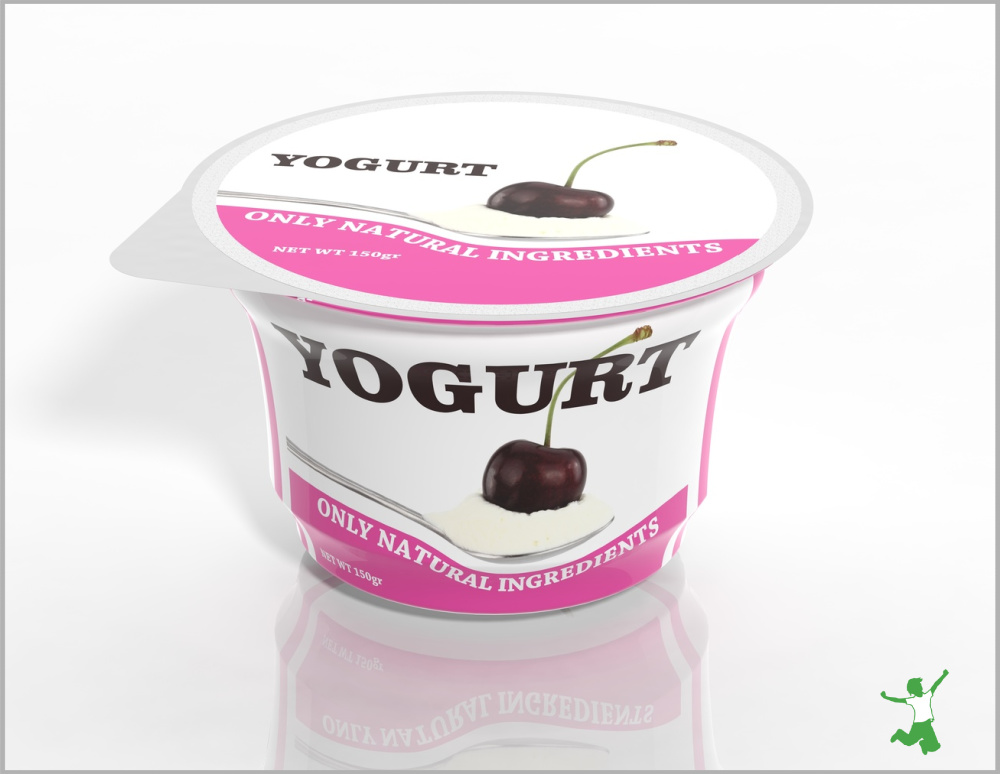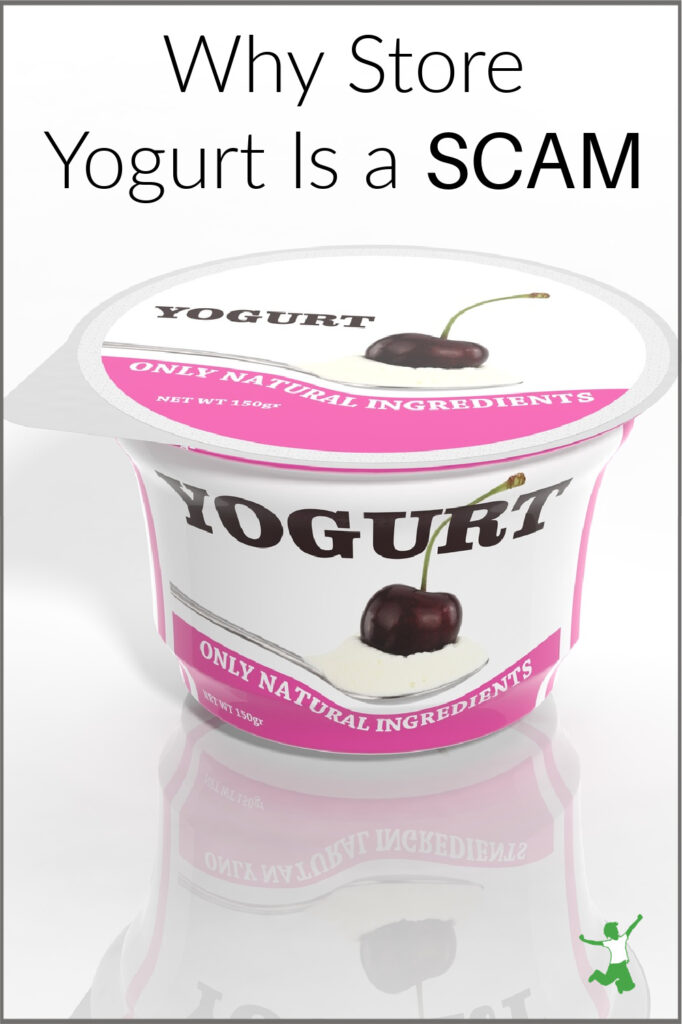The reasons why it is usually a waste of money to buy yogurt at the grocery store, the very few brands that are legit, and the best approach for enjoying yogurt that is truly probiotically active without breaking the bank.

As I was standing in line at the grocery store the other day, I noticed an older lady in front of me had an entire cart loaded with commercial yogurt.
I immediately felt very empathetic as she obviously was placing high importance on store yogurt in her diet. Perhaps she was attempting to help some sort of chronic digestive issue caused by the typical overmedicating of people her age.
What is really sad is that it is virtually certain that she was experiencing little to no benefit from her efforts and money spent.
This is because standard store yogurt, including those squeezable yogurt tubes for kids, is not the probiotically beneficial food that TV commercials and other compelling advertisements would lead you to believe.
The truth is that commercial yogurt is fermented for very short periods of time.
This includes highly popular Greek yogurt alternatives.
Improper Fermentation
The length of fermentation for commercial yogurt brands is so short (one person in the dairy industry told me that it is an hour or even less) that thickening agents are commonly added to give it the look and feel of real yogurt.
This is why Dr. Natasha Campbell-McBride MD, author of Gut and Psychology Syndrome, recommends avoiding commercial yogurt.
Instead, she recommends making yogurt at home and fermenting it for a full 24 hours to achieve maximum gut healing benefits.
The Specific Carbohydrate (SCD) Diet also recommends yogurt that is cultured for a full 24 hours.
Milk Sugars (Lactose) Still Present
Another problem that occurs by cutting corners at the factory is that commercial yogurt still contains plenty of lactose, as there was insufficient time for it to be completely consumed by the beneficial microbes.
Lactose is a disaccharide sugar, which is very difficult to digest for anyone with a digestive disorder.
Raw milk and raw yogurt contain lactase, the enzyme for digesting lactose, but pasteurized and homogenized store brands do not even if they are organically certified (heat destroys the enzyme lactase).
Thus, consuming commercial yogurt can often trigger autoimmune symptoms until steps are taken to heal and seal the gut wall so that it is no longer permeable.
In short, not only will store yogurt NOT help heal the gut, it can potentially make the situation WORSE.
GMO Sweeteners
Another problem with commercial yogurt is that sweetened versions often are of GMO origin.
Even health-savvy shoppers often don’t realize that if the label on commercial yogurt says “sugar”, it is virtually certain that sugar is also from a GMO source (beet sugar).
Only if the label says “cane sugar” or “organic sugar” does this guarantee that the sugar is GMO-free.
Other Considerations
Of course, making yogurt at home permits the selection of high-quality milk and avoidance of all the additives and sugar added to most commercial versions.
Yogurt fermented for 24 hours will most definitely assist your gut with the help of beneficial (though transitory) cultures that good quality yogurt is loaded with.
It is also helpful to note that yogurt made with raw milk will be naturally more drinkable-style like kefir than yogurt made with heated or pasteurized milk.
Cannot Make Yogurt Yourself?
The best policy when it comes to yogurt is to always make it yourself or buy it from a small farm that uses quality grass-fed milk (preferably raw) and ferments it properly.
You don’t need a yogurt maker! I make raw yogurt using a slow cooker. You can even make yogurt using your microwave (turned off, of course!) or oven as a low-temperature incubator.
If you must buy commercial yogurt when traveling, be sure to seek out one of the only two brands of 24-hour yogurt I’ve found that are commercially available (White Mountain and St. Benoit).
If you’ve come across any others, please add them in the comment section!
My online shopping hack will help you find these brands very quickly even if you are unfamiliar with the area you are visiting.









Disgusting junk food!
I enjoy reading your posts, but it drives you to craziness!!! If you constantly have to worry about everything we eat and drink, what’s the use!!
Gage has corn starch…gmo corn, probably Bt corn. At least Chobani doesn’t have corn!
I personally look for the word probiotic on the label or i wont buy yogurt. Unles im eating it just for flavor and not to fight an infection. YOu can buy probiotic suplement vitamins also, instead of eating yogurt.
Nothing in this article is prooven fact. It needs to site its resources. Where did the journalist get their information from? So far all we have is 1 doctors word about this. Some one’s opinion. Nothing more.
Anyone can make up information and post an article on the web. (not accusing this of being correct or incorrect). People are so eager to believe everything they see in writing.
(example: the word gullible isn’t in the dictionary.)
This is also this is a ‘.com’ website which can be filled with made up information, not backed up by sources. I’m more opt to trust a ‘.org’ , ‘.net’ and ‘.gov’ site for information over a ‘.com’ link.
Please tell me the Fage Greek yogurt from Costco is real…that is the only stuff I buy.
I get organic kefir and plain greek(not reduced fat) yogurt. Check the packaging for the amount of probiotics per serving. If it doesn’t say, leave it, it probably doesn’t have much. And get to know what ingredients to avoid. Or make your own.
Chad, for Greek yogurt, just strain the whey out of your homemade yogurt. It’ll make it thicker and higher in fat, which is what real Greek is. Or add a bit of “grass fed” gelatine if you want less fat, but milk fat won’t make anyone fat.
I make yogurt and kefir every week with raw milk for my family!
Is there a good site about making Greek youqurt ? I eat alot of youqurt due to some past surgeries on my stomach .Its one of my main protien sources ?
Kathleen Jones Ponto – Chobani has said themselves that it would be too expensive to use non-GMO ingredients. “All natural” doesn’t mean diddly – there isn’t much regulation on that term. I personally do use Stoneyfield but they are still lowfat which I hate. We don’t have raw milk readily available in our area or I would make my own!
I remember my ex used to eat store bought yogurt trying to be “healthy” and she ended up gaining weight!
I don’t eat yogurt much myself! I prefer my homemade kefir made from raw grassfed milk! It has many more strands of beneficial microbes and it’s way easier to make! 🙂